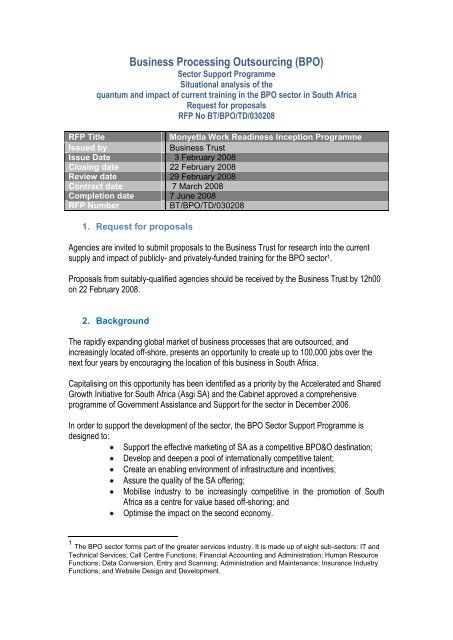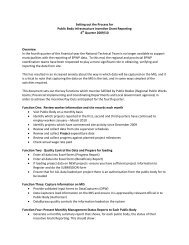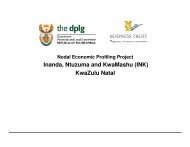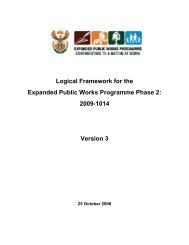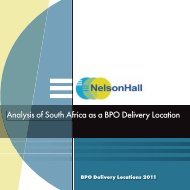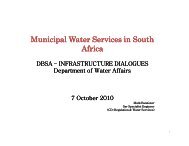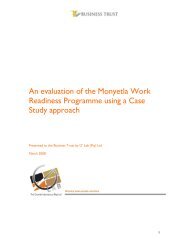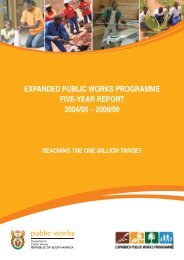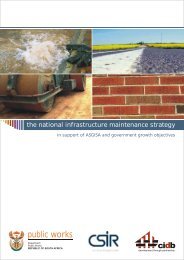Business Processing Outsourcing (BPO) - Business Trust
Business Processing Outsourcing (BPO) - Business Trust
Business Processing Outsourcing (BPO) - Business Trust
Create successful ePaper yourself
Turn your PDF publications into a flip-book with our unique Google optimized e-Paper software.
<strong>Business</strong> <strong>Processing</strong> <strong>Outsourcing</strong> (<strong>BPO</strong>)<br />
Sector Support Programme<br />
Situational analysis of the<br />
quantum and impact of current training in the <strong>BPO</strong> sector in South Africa<br />
Request for proposals<br />
RFP No BT/<strong>BPO</strong>/TD/030208<br />
RFP Title<br />
Issued by<br />
Issue Date 3 February 2008<br />
Closing date 22 February 2008<br />
Review date 29 February 2008<br />
Contract date 7 March 2008<br />
Completion date 7 June 2008<br />
RFP Number<br />
BT/<strong>BPO</strong>/TD/030208<br />
1. Request for proposals<br />
Monyetla Work Readiness Inception Programme<br />
<strong>Business</strong> <strong>Trust</strong><br />
Agencies are invited to submit proposals to the <strong>Business</strong> <strong>Trust</strong> for research into the current<br />
supply and impact of publicly- and privately-funded training for the <strong>BPO</strong> sector 1 .<br />
Proposals from suitably-qualified agencies should be received by the <strong>Business</strong> <strong>Trust</strong> by 12h00<br />
on 22 February 2008.<br />
2. Background<br />
The rapidly expanding global market of business processes that are outsourced, and<br />
increasingly located off-shore, presents an opportunity to create up to 100,000 jobs over the<br />
next four years by encouraging the location of this business in South Africa.<br />
Capitalising on this opportunity has been identified as a priority by the Accelerated and Shared<br />
Growth Initiative for South Africa (Asgi SA) and the Cabinet approved a comprehensive<br />
programme of Government Assistance and Support for the sector in December 2006.<br />
In order to support the development of the sector, the <strong>BPO</strong> Sector Support Programme is<br />
designed to:<br />
Support the effective marketing of SA as a competitive <strong>BPO</strong>&O destination;<br />
Develop and deepen a pool of internationally competitive talent;<br />
Create an enabling environment of infrastructure and incentives;<br />
Assure the quality of the SA offering;<br />
Mobilise industry to be increasingly competitive in the promotion of South<br />
Africa as a centre for value based off-shoring; and<br />
Optimise the impact on the second economy.<br />
1 The <strong>BPO</strong> sector forms part of the greater services industry. It is made up of eight sub-sectors: IT and<br />
Technical Services; Call Centre Functions; Financial Accounting and Administration; Human Resource<br />
Functions; Data Conversion, Entry and Scanning; Administration and Maintenance; Insurance Industry<br />
Functions; and Website Design and Development.
3. Talent Development for South African <strong>BPO</strong><br />
The availability of work-ready talent is one of the key factors considered by prospective<br />
investors. Cross-sector skills research led to the formulation of a skills development strategy<br />
with three objectives for focused, rapid development of talent for the <strong>BPO</strong> sector:<br />
To increase the pool of entry-level employable people through the Monyetla Work Readiness<br />
Programme.<br />
To accelerate the development of home-grown supervisors and managers by developing<br />
supervisors, team leaders & managers through the levy grant and tax incentives system.<br />
To ensure the ongoing building of a globally competitive talent pool by encouraging life-long<br />
learning and training through the National Skills Development Strategy.<br />
There are currently a number of different approaches to talent development within South Africa, both<br />
publicly and privately funded. To date, a comprehensive situational analysis of the current approach to,<br />
quantum and impact of training has not been researched.<br />
The purpose of the proposed situational analysis is to gather, collate and analyse information on the<br />
scope, scale and impact of current talent development approaches for the <strong>BPO</strong> sector in South Africa.<br />
4. Sectors to be probed<br />
At least the following sectors should be probed to establish which approaches to talent development are<br />
currently being used, and what impact this training and development approach may have achieved.<br />
Publicly-funded <strong>BPO</strong> Talent Development approaches<br />
1. National Skills Fund: Funding to Provincial Governments to support the implementation of their<br />
PGDS<br />
2. National Skills Fund: Funding to Provincial Departments of Labour for <strong>BPO</strong><br />
3. National Skills Fund: Funding channelled through Department of Trade & Industry as part of<br />
GAS programme, and formerly SMED programme<br />
4. National Skills Fund: Monyetla Programme<br />
5. Services SETA: learnerships and skills programmes<br />
6. Umsobomvu Youth Fund: Monyetla Programme<br />
7. Local government initiatives, Cities of Johannesburg, Cape Town and Durban<br />
8. South African Revenue Service<br />
9. Tourism information bodies<br />
Privately-funded <strong>BPO</strong> Talent Development approaches<br />
Pirvately-funded <strong>BPO</strong> includes both inbound and outbound-focused entities.<br />
privately-funded <strong>BPO</strong> Talent Development sectors are to be probed:<br />
At least the following<br />
Airlines<br />
Banking<br />
Car hire<br />
Computershare<br />
Credit Management<br />
Health care<br />
Hotels<br />
IT and IT support
Marketing<br />
Non-life insurance<br />
Life insurance<br />
Software and computer services<br />
Telephony<br />
Travel<br />
Wholesale and retail<br />
5. Issues to be probed<br />
5.1. Descriptive and quantitative issues<br />
The research should provide information on at least the following:<br />
Is the <strong>BPO</strong> entity for which training has been provided an outsourcer, captive or a combination of both<br />
In which province/s is the entity active in <strong>BPO</strong><br />
How many seats does the entity have<br />
To which SETA does the entity pay its skills development levy<br />
To what extent does the entity use the levy-grant system<br />
Is training nationally or internationally accredited (eg Edexcel, NQF, proprietary)<br />
Is certification/accreditation gained by successful learners Describe nature of certification.<br />
Are accredited training providers used or is the employer accredited as a trainer<br />
Is training assessed for competence, and, if so, how Or is only attendance recorded<br />
At which levels is training offered (entry level, advanced agent training, supervisory, management)<br />
What is the duration of the training at each level<br />
How many people at each level have been trained in 2005, 2006 and 2007<br />
How many people at each level were found competent/passed the training<br />
5.2. Impact and qualitative issues<br />
The research should cover at least the following:<br />
What relationship was discerned between training and productivity<br />
Were learners/staff employed on conclusion of the training If so, how many<br />
Were trained staff promoted Is there career path development<br />
Were trained staff retained by the company<br />
Did staff who leave remain within the <strong>BPO</strong> sector<br />
Was cost-effectiveness measured and, if so, how<br />
Recommendations by employers<br />
Recommendations by the research agency<br />
6. Proposed roll out timelines and actions<br />
Action<br />
Date<br />
RFP advertised in Sunday Times & BT website 3 February 2008<br />
Proposals due 22 February 2008<br />
Adjudication of proposals 29 March 2008<br />
Contract, including deliverables, prepared 7 March 2008<br />
Research commences 15 March 2008<br />
Progress report 1 and meeting to discuss 30 April 2008<br />
Progress report 2 and meeting to discuss 31 May 2008<br />
Final report presented 30 June 2008
7. Proposals<br />
Proposals are requested for the design and implementation of the research project.<br />
Four hard copies of proposals should be delivered by 12h00 on 22 February 2008 to:<br />
<strong>Business</strong> <strong>Trust</strong> – attention Dikgapha Khumalo<br />
3rd floor Building 13<br />
The Woodlands<br />
Woodlands Drive<br />
Woodmead<br />
Johannesburg<br />
One electronic copy should be submitted to Dikgapha@btrust.org.za by 12h00 on 22 February 2008.<br />
Proposals, which may not exceed 30 pages, including annexures, should contain the following<br />
information:<br />
7.1 Summary of offering<br />
Proposals should specify the research methodology and tools to be used;<br />
Proposals should clarify the approach to sampling and sample size selected;<br />
Proposals should provide a list of key questions;<br />
Proposals should provide the overall cost of the programme; and<br />
Proposals should detail the timing of the key deliverables.<br />
7.2 Approach<br />
Describe how you understand the project which is to be implemented and what its components<br />
are.<br />
Describe your approach to achieving the objectives of the proposed research project.<br />
Set out the core activities and specific actions required to achieve the overall objectives, and<br />
specific objectives, in a project plan.<br />
7.3 Implementing agency:<br />
Describe your agency, including its members and the roles they will play.<br />
Describe the research experience of your agency and provide contactable references.<br />
Provide an assessment of the capacity of your agency.<br />
Describe the manner in which the project implementation will be planned and managed.<br />
Set out the systems for organisation of work, admin, quality control and monitoring.<br />
7.4 Budget:<br />
• Show the budget, broken down into clearly defined line items.<br />
7.5 Project management:<br />
Provide an analysis of key dependencies and risks associated with implementation.<br />
Set out a schedule of key activities, milestones and timing.<br />
Identify actions required of other key stakeholders.
8. Review procedures<br />
This request for a proposal does not constitute an offer to purchase any service. The <strong>Business</strong> <strong>Trust</strong><br />
reserves its rights to accept or reject the proposal and to proceed with the implementation of the<br />
Monyetla Inception Project (or not) with or without the proposer.<br />
Proposals will be assessed in terms of the <strong>Business</strong> <strong>Trust</strong> procedures. These may include, at the<br />
discretion of the <strong>Trust</strong>, the assembly of a review panel to consider short-listed proposals. A preferred<br />
bidder or bidders will be selected on criteria that will include, but not be limited to, price.<br />
9. Contracting arrangements<br />
In respect of successful proposals, contracts will be entered between the <strong>Business</strong> <strong>Trust</strong> and the<br />
research agency, which will reduce the successful proposals to contracted deliverables against which<br />
the agency will be required to perform.<br />
10. Payment schedule<br />
Agencies are requested to propose a suitable payment schedule.<br />
11. Pre-requisites<br />
Agencies wishing to submit proposals must provide:<br />
Evidence of at least five years of research experience. List projects completed.<br />
The curriculum vitae of the person who will lead the research project.<br />
A minimum of three contactable references for whom research has been done.<br />
A valid tax clearance certificate


